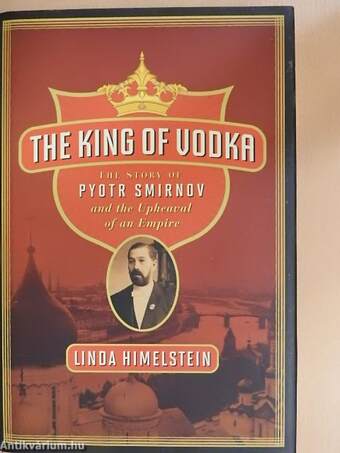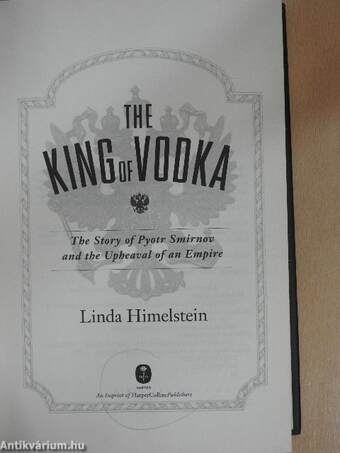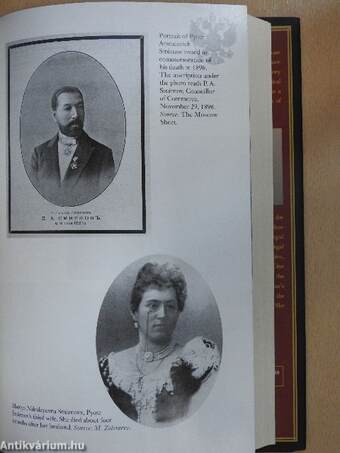1.116.661
kiadvánnyal nyújtjuk Magyarország legnagyobb antikvár könyv-kínálatát
The King of Vodka
The Story of Pyotr Smirnov and the Upheaval of an Empire
| Kiadó: | HarperCollins Publishers |
|---|---|
| Kiadás helye: | New York |
| Kiadás éve: | |
| Kötés típusa: | Fűzött kemény papírkötés |
| Oldalszám: | 384 oldal |
| Sorozatcím: | |
| Kötetszám: | |
| Nyelv: | Angol |
| Méret: | 24 cm x 16 cm |
| ISBN: | 978-0-06-085589-5 |
| Megjegyzés: | Fekete-fehér fotókkal. |
naponta értesítjük a beérkező friss
kiadványokról
naponta értesítjük a beérkező friss
kiadványokról
Előszó
TovábbFülszöveg
In this sweeping history of vodka scion Pyotr Smirnov and his family, distinguished journalist Linda Himelstein plumbs a great riddle of Russian history through the story of a humble serf who rose to create one of the most celebrated business empires the world has ever known. Aí the center of this vivid narrative, Pyotr Smirnov comes to life as a hero of wonderful complexity—a man of intense ambition and uncanny business sense, a patriarch of a family that would help define Russian society and suffer from the revolution's aftermath, and a loyalist to a nation that would one day honor him as a treasure of the state.
Born in a small village in 1831, Smirnov relied on vodka—a commodity that in many ways defines Russia—to turn a life of scarcity and anonymity into one of immense wealth and international recognition. Starting from the back rooms and side streets of nineteenth-century Moscow, Smirnov exploited a golden age of emancipation and briUiant grassroots marketing strategies to... Tovább
Fülszöveg
In this sweeping history of vodka scion Pyotr Smirnov and his family, distinguished journalist Linda Himelstein plumbs a great riddle of Russian history through the story of a humble serf who rose to create one of the most celebrated business empires the world has ever known. Aí the center of this vivid narrative, Pyotr Smirnov comes to life as a hero of wonderful complexity—a man of intense ambition and uncanny business sense, a patriarch of a family that would help define Russian society and suffer from the revolution's aftermath, and a loyalist to a nation that would one day honor him as a treasure of the state.
Born in a small village in 1831, Smirnov relied on vodka—a commodity that in many ways defines Russia—to turn a life of scarcity and anonymity into one of immense wealth and international recognition. Starting from the back rooms and side streets of nineteenth-century Moscow, Smirnov exploited a golden age of emancipation and briUiant grassroots marketing strategies to popularize his products and ensconce his brand within the thirsts and imaginations of drinkers around the world. His vodka would be gulped in the taverns of Russia and Europe, praised with accolades at world fairs, and become a staple on the tables of tsars. His improbable ascent—set against a sobriety crusade supported by Chekhov and Tolstoy, mounting political uprisings and labor strikes, and the eventual monopolization af the vodka trade by the state—would crumble amid the chaos of the Bolshevik revolution. Only a set of bizarre coincidences—including an incred-ible prison escape by one of Smirnov's sons in 1919—would prevent Smirnov's legacy from fading into oblivion.
Set against a backdrop of political and ideological currents that would determine the course of global history—from the fall of the tsars to the rise of
(eontinued from front flap)
communism, from vodka's popularization by none other than James Bond to Smirnoff's emergence as a multibillion-doliar brand—Smirnov's story of triumph and tragedy is a captivating historical touchstone. The King of Vodka is much more than a biography of an extraordinary man. It is a work of narrative history on an epic scale.
LINDA HIMELSTEIN began her career in the Washington bureau of the Wall Street Journal before working at the San Francisco Recorder and the Legai Times. In 1993 she joined Business Week as a legai affairs editor, writing about a wide array of topics, including the tobacco industry and Wall Street. One of her cover stories helped Business Week win the National Magazine Award. Later, as the magazine's Silicon Valley bureau chief, she wrote about the infancies of eBay, Yahoo!, and other companies. She lives with her family in Northern California Vissza
Témakörök
- Életrajz > Egyéb
- Idegennyelv > Idegennyelvű könyvek > Angol > Műszaki
- Idegennyelv > Idegennyelvű könyvek > Angol > Egyéb
- Idegennyelv > Idegennyelvű könyvek > Angol > Művelődéstörténet
- Idegennyelv > Idegennyelvű könyvek > Angol > Háztartástan > Konyhaművészet > Italok
- Művelődéstörténet > Életmód > Háztartástan > Konyhaművészet > Italok
- Műszaki > Ipar > Ipartörténet
- Műszaki > Ipar > Könnyűipar > Élelmiszeripar > Italgyártás
- Háztartástan > Konyhaművészet > Italok > Szeszes italok
- Mezőgazdaság > Termékfeldolgozás > Növény > Szesz
- Idegennyelv > Idegennyelvű könyvek > Angol > Életrajz
- Műszaki > Idegennyelv > Angol
- Műszaki
Linda Himelstein
Linda Himelstein műveinek az Antikvarium.hu-n kapható vagy előjegyezhető listáját itt tekintheti meg: Linda Himelstein könyvek, művekMegvásárolható példányok
Nincs megvásárolható példány
A könyv összes megrendelhető példánya elfogyott. Ha kívánja, előjegyezheti a könyvet, és amint a könyv egy újabb példánya elérhető lesz, értesítjük.











